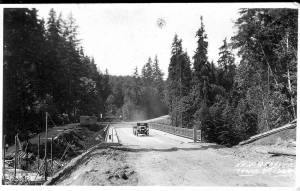High expectations drive downtown Everett building boom
Published 1:31 pm Friday, May 15, 2015
EVERETT — Mayor Ray Stephanson can see the city changing from his corner office on the 10th floor of the Wall Street Building.
Looking west over downtown, the view includes such recent developments as the Artspace lofts, Aero Apartments and the Potala Place apartments and market. The view also includes a handful of old homes and low-rise retail buildings, where tenants include pawn shops and a bail bondsman.
Local boosters and developers say the upscale apartment buildings going up are the leading edge of downtown’s rebirth.
City planners expect Everett’s population to grow by nearly 40 percent, or 40,000 people, for a total of 143,000 by 2035. County planners put the number even higher, at about 60,000. The number of jobs in the area is already growing and is expected to keep pace with population, according to economic forecasts.
The upshot is that downtown Everett might change more in the next 20 years than it has in the past 20 as the urban core evolves from a gritty, post-industrial downtown to one where the sidewalks are busy from morning until night.
Of course, no one can say exactly how that process will unfold. Or if it will at all.
Perhaps the city and developers won’t overcome the hurdles to a downtown rebirth. Perhaps people won’t give up their back yards, suburban malls and big-box stores for apartments, boutique retailers and upscale food stores.
Stephanson thinks they will.
“I think what’s happened in Ballard will happen in Everett,” Stephanson said, referring to the formerly working-class, industrial neighborhood of Seattle that has sprouted condominiums for young professionals while preserving some industry.
The vision
Developers have poured tens of millions of dollars into downtown Everett and its periphery in recent years, and more money is on the way.
In the past 10 years, more than 350 apartments and other rental units have been built in the downtown area. Buildings under construction now will add another 380 units. The two biggest projects are Path America’s Potala Place, which will add 220 units and about 60,000 square feet of retail, and the 102-unit Aero Apartments by Skotdal Real Estate.
“There does seem to be a push among the newer members of the workforce for urban living,” said Jim O’Hanlon, vice president of Touchstone Northwest, the developer of the new Courtyard by Marriott hotel scheduled to open in 2016.
The economic trend points to more visitors, as well, drawn by the Boeing Co., Naval Station Everett and events at Xfinity Arena or its adjoining conference center.
Those attractions are such sure things that a 156-room hotel in the middle of downtown was deemed a good investment — today.
“We didn’t feel like we needed to project out five or 10 years to make the hotel make sense,” O’Hanlon said. “We wish we could have been open a year ago.”
From his office, Stephanson can see a downtown with streets as busy as when he was a kid. “There were drug stores, Bon Marche, Penney’s. We’d spend all day downtown trying to stay out of trouble.”
For the past decade, the city’s done what it can to bring people back downtown. The planning department has worked with developers to ease the building process, Stephanson said. The city has also supported new arts and cultural facilities and institutions in and near downtown, such as a farmers market, the Schack Art Center and Jetty Island park.
Stephanson’s primary focus has been on big issues, though, such as attracting Washington State University to the city’s north end, keeping Boeing jobs in the city and pushing for a light-rail extension from Seattle.
Developers are taking notice.
“Everett is in a growth process,” said Steve Carlin, a retail consultant and owner of Carlin Co. in Napa, California. He and Dargey Development are partners in Potala Farms, the boutique grocery anchoring Potala Place’s retail space.
That growth will mean more people downtown with money to spend on locally grown and upscale food.
The median household income in Everett is expected to rise to $56,857 by 2018, an increase of $6,000 since 2013, according to a 2014 market study by Seattle-based O’Connor Consulting Group for the Port of Everett.
“What I see is upside,” Carlin said.
At the same time, Potala Farms is an experiment, he said. “We want to test the concept. It sounds good, but we want to make sure it really works.”
Carlin’s partner, Dargey Development, and Skotdal Real Estate, who together are downtown Everett’s biggest developers, declined to comment for this story.
Crown jewels
The largest developments in the city’s plans lie just outside downtown. Both promise to add hundreds of upscale residential units and acres of office and retail space.
They’ll be the “crown jewels” of Everett’s future, Stephanson said.
Homes are already going up a couple of miles southeast of downtown, at Riverfront, a development of Polygon Northwest. It will have about 235 single-family homes and 190 townhomes and a commercial center at the former site of the Everett tire fire of 1989.
To the northwest, the Port of Everett plans to start construction next year on the first phase of Waterfront Place. A future two-acre public park has been seeded. There are plans for 660 condos, townhomes and apartments designed to appeal to young professionals, said Terrie Battuello, the port’s economic development director.
The port has big hopes for the project, which is to include two hotels, high-end restaurants, lots of open space, office and retail space, and marine services. The aim is to bring people to the city waterfront to live, work and have fun.
In terms of how Everett is perceived, “a project like this will be a game-changer for the city,” Battuello said.
“A cloud has sat over Everett for a long time,” she said.
Growing pains
Despite early momentum by developers, some factors driving growth are beyond control: Will voters in 2016 approve a Sound Transit light-rail line to Everett? Will people opt for downtown living over suburbia? How will growth in neighboring cities affect Everett?
An update of the city’s comprehensive plan aims to anticipate roads, sewer service and other infrastructure needed to accommodate a growing population.
City planners expect Everett will need more than 15,000 new apartments, homes, condos and other housing units in the next 20 years to accommodate growth. They anticipate the 93,739 jobs counted in 2011 growing to about 140,000. Snohomish County forecasts even more growth in its “Vision 2040” projections — an Everett population greater than 165,000 and 146,000 jobs.
Planning documents rarely mention another population, less desirable for prospective residents. Homelessness and related social problems are critical to how the city is perceived, which affects development.
“We’re not different from other cities, but we have to find a way to take some action,” Stephanson said.
Last year the mayor launched a Community Streets Initiative to find solutions to myriad problems surrounding homelessness, mental health, addiction and street crime in the city. At the same time, spending on social services has been cut at nearly every level of government in recent years, he said.
“This stuff is not going to get solved overnight. It’s going to be a long, intentional effort,” he said.
All these factors make for a complicated puzzle, and if any piece is missing, that could render all the projections meaningless.
Economic drivers
Stephanson points to the maritime industry as one of his big hopes for the city’s future.
“A lot of the same technical skills for a machinist assembling an airplane can be transferred to shipbuilding, for example,” he said.
There is enough room on the waterfront to establish new maritime services and maintenance businesses that can serve either the private market or Naval Station Everett. One property, the former Kimberly-Clark pulp mill site, has been touted as a potential future home for Foss Maritime, the tugboat company now in Seattle, although the land is tied up in a lawsuit over environmental cleanup.
Another key piece is Washington State University North Puget Sound, now housed on the campus of Everett Community College. WSU is expected to spill across Broadway into a run-down shopping center that the community college already owns.
A growing student body will likely give a boost to downtown commerce, said Joseph Minicozzi, a principal at Urban3, an Asheville, North Carolina, consulting firm that studies the economics of urban development.
“College students and 20-year-olds don’t have bottoms in their pockets — money just flows out into the streets wherever they go,” he said.
Many community college students live on tight budgets, and a lot of student spending focuses on inexpensive products like pizza and beer, Minicozzi said, but colleges and universities do have an economic impact on surroundings.
The proposed $61 million University Center building for WSU will be the heart of the new campus. WSU class offerings would initially focus on software engineering, sustainable food systems and data analysis. Stephanson’s administration has also publicly supported WSU’s bid to open a second medical school, in Spokane, which he hopes will feed Everett’s medical industry, centered on Providence Regional Medical Center Everett.
The overall hope, Stephanson said, is that students getting an education in Everett will join the city’s growing workforce.
EvCC leaders say University Center isn’t just for WSU. It could also be home to courses of the University of Washington, Western Washington University and Central Washington University.
Meanwhile, Trinity Lutheran College is building a 125-student dormitory on Rockefeller Avenue downtown.
While a university presence definitely helps, Urban3’s work has found that the strongest economic boost comes from focused downtown development and spaces attractive to businesses.
There’s a bit of a “Moneyball” approach that’s worked in Asheville and other cities, Minicozzi said, referencing the seminal book about how statistical analysis revolutionized the economics of baseball.
Nowadays, many successful teams pursue inexpensive hitters who walk a lot or hit singles as much as they seek expensive home-run sluggers.
There’s a parallel in business development: Cities get better returns developing and nurturing small businesses rather than, say, competing with other states for Boeing jobs, Minicozzi said. “It’s important, but what if you lose?”
Cities need to “provide a fertile infrastructure for the seeds to grow rather that going out and buying a garden,” Minicozzi said.
It gives local and smaller businesses more reason to stay, and a homegrown business could even turn into a Microsoft down the road, he said.
Everett’s economic development director, Lanie McMullin, said she wants to bring a for-profit business incubator to downtown. Such operations provide office space and services to start-ups in return for an ownership stake, essentially betting on the company’s potential.
“If we’re successful, it would be the first of all sorts of incubators,” McMullin said.
Even with a lot of new construction, many new businesses will likely go into existing storefronts, she said.
That means downtown’s skyline might not change as much as indicated by rising apartment buildings. It will likely keep its blue-collar grit alongside new boutique retail. And it means the million-dollar view of Puget Sound from Stephanson’s office will still be there — no tall buildings in the way.
Then again, the mayor said, economic forces could one day turn the city government out of its current home in a glass tower. “Everything’s for sale,” Stephanson said.
Chris Winters: 425-374-4165; cwinters@heraldnet.com. Twitter: @Chris_At_Herald. Dan Catchpole: 425-339-3454; dcatchpole@heraldnet.com; Twitter: @dcatchpole.




